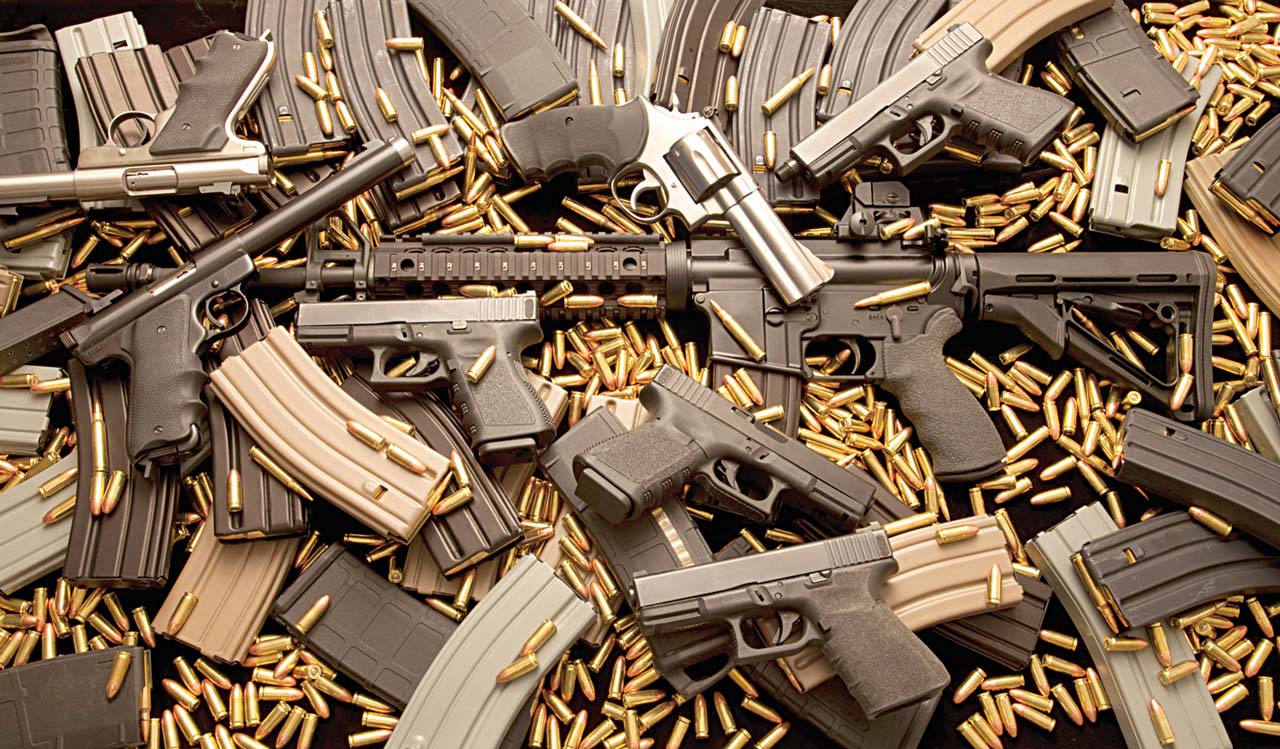
When the late President Musa Yar’Adua, put in place a Presidential Amnesty Programme, as one of his administration’s efforts towards quelling the raging militancy that threatened to annihilate oil exploration in the Niger Delta, which is the mainstay of the country’s economy, many applauded him for taking that route.
But the entire country and indeed the international community was in deep shock at the volume of arms and ammunition that were mopped up from the region, during the surrendering exercise, one of the steps that qualified the agitators/militants for the presidential amnesty.
In October last year, another round of heavy weaponry was harvested in Rivers State, when 22, 430 militants, agitators, criminals, cultists and sundry characters embraced the amnesty offer of the state government, and surrendered about 1, 000 firearms, 7, 661 rounds of ammunition, and 147 explosives.
However, what has baffled many is the fact that there are always sophisticated weapons to be submitted to the authorities by disgruntled members of the public every time the government grants amnesty to outlaws.
This, therefore brings to the fore, issues like how illicit firearms find their way into the hands of unlicensed and unauthorised users, including non-states actors, and the role played by security operatives at the country’s boarders and ports in restocking illicit arms in the country.
In the last two years or thereabouts, sophisticated weapons and ammunition including pump action riffles, Israeli made sub-machine guns- Uzi, Italian made submachine guns- Beretta, Kalashnikov riffles, among other equipment that could prove very lethal in wrong hands have ceaselessly poured into the country.
The alleged involvement of men and officers of the Nigerian Custom Service (NCS) in the clearance of 661 pump-action rifles, large enough to equip an army battalion may have informed the decision of Comptroller General of the NCS, Col. Hameed Ali (rtd), to order a high-powered investigation into the matter, shortly after which it declared some of its personnel wanted, for their alleged involvement in the saga. This was after Messers Oscan Okafor, Mahmud Hassan and Sadique Mustapha, were arrested for the unlawful importation of 49 boxes containing a total number of 661 high-calibre guns. The lid in the unfortunate transaction, involving the custom officers and the threesome was blown open when a short-changed party, whose interest was not well-protected let the information out.
Before the latest arrest in Lagos, a series of illegal importation of firearms into the country have been going on clandestinely, with alleged active connivance of security agencies.
For instance in 2010, the NCS seized 13 containers loaded with rockets and grenades, shipped in from the Islamic Republic of Iran.
In 2016, a man identified as Christian Mbachi, was arrested by the Tin Can Island Command of the NCS, over the unlawful importation of firearms, gas masks, and bulletproof vests.
Yusuf Bashar, the area commander of the NCS had informed newsmen that the items carefully concealed in two vehicles were smuggled into the country from the United States.
Still as a reflection of the porous nature of our entry points, in 2016, the Seme Command of the service seized three bullet-proof vehicles, which combined Duty Paid Value stood at N76m.
The area controller, Victor Dimka, who spoke at a briefing, revealed that one of the bullet-proof cars, a 2012 Mercedes C300, was intercepted at Badagry, with an official Federal Government number plate, which read FG 35 S02.”
These and many other instances lend credence to the alarm raised by the United Nations that over 350 million, or 70 per cent of an estimated 500 million Small Arms and Light Weapons (SALW) circulating in West Africa were domiciled in the country.
Director of the United Nations Regional Centre for Peace and Disarmament in Africa (UNREC), Olatokunbo Ige, gave the statistics at the National Consultation on Physical Security and Stockpile Management (PSSM) in Abuja, in August last year, at the event it organised alongside the Presidential Committee on Smalls Arms and Light Weapons (PRESCOM).
On that occasion, Ige said: “The illicit proliferation of SALW has had a dramatic impact on peace and security in Africa, threatening not only the existence of the state, but also the livelihoods of millions of people across the continent.
She singled out Nigeria as “one of the countries that is experiencing some of the most devastating effects of the proliferation of SALW as a result of spillover effect of the recent crises in Libya, and Mali, as well as, unresolved internal conflicts in different parts of the country, especially in the North East, Niger Delta and southern regions.
She had warned that warned that, “as alarming as these figures seem, it is very clear that if left unchecked, this scourge will not only jeopardise the developmental gains achieved over the last 50 years, but will also impede the nation’s capacity to achieve its developmental targets and therefore, negatively impact on the future generations.”
It is in the light of this grim scenario, that the interception of the 661 riffles secured in 49 boxes in Lagos, remains a saddening news, which indicates that a lot still needs to be done to rid the country of illicit arms. This step, many agree should start with ridding the country’s boarders and seaports of corrupt and compromised security operatives.
Though the NCS comptroller general has already instituted a high-powered investigation into the shock find, stakeholders are calling for a thorough job to be done so that issues are not swept under the carpet, just as a retired military brasshat is recommending capital punishment for those involved in the saga.
Speaking to The Guardian, the Public Relations Officer, NCS Federal Operations Unit (FOU), Zone A, Jerry Attah, said as investigation goes on, more suspects may be picked up as the service has extended its investigations to terminal operators that handled the cargo. Among the suspects so far arrested are the importer, clearing agent, escorts and three customs officers.
He added that the suspects would eventually be transferred to the Nigerian Police upon the completion of in-house investigations.
For now, “The accused have been moved to the NCS Headquarters, and I can also confirm to you that all the suspects that were declared wanted are now in custody. The terminal operators from APMT Terminal are still here with us for investigations.”
Commenting on the development, the Chief Operating Officer, Goldwater and Riversand Consults, Captain Aliyu Umar Babangida (rtd), said the Federal Government should deal with the officers involved in the arms importation saga as saboteurs for putting the security of the nation in jeopardy. He also suggested capital punishment in order to serve as a deterrent to others.
“Because of what has happened, it is time for us to find out what has happened to the Nigerian law on sabotage. And it is time for us to be asking Mr. President, ‘Where is the law on sabotage, particularly as it pertains to men in uniform,’ he said.
Babangida continued: “Whatever it is, if anybody should be forgiven for being part of such crime, it should not be a customs officer. Civilian can ignorantly get involved in such things for the purposes of making money, but for a customs officer, it should never be the case… The moment those officers are tried as saboteurs and what the law stipulates is done to them, everybody will sit tight.”
The defence and security expert added that those behind the importation of the firearms felt free to go ahead with it because there were willing customs officers to assist them in their endeavour.
He maintained that as the government strives to secure the nation, security agencies should complement such efforts so that businessmen that have little or no respect for human lives can take their wares elsewhere.
The retired colonel, who deplored claims that illicit arms find their way into the country because our borders are porous said for him, that argument does not hold any water because “we have been at it since 1960. The real problem is that Nigeria is a grand population of indolence. We are so indolent to the point that we create excuses. If I were the comptroller general of customs, one unwholesome incident at my port, and the head of one customs officer would roll. Whatever it requires to hold the port properly, I would advise my men to put it in writing and bring it to me, and I will make sure that the president does not sleep until I have all that I need to work effectively. But the caveat there would be that when I give you all you need to work effectively, you must give me results else I will take your job away.
“If I give you a target and you don’t meet it, I will give it to someone else. If you go into investigation of those three customs officers, their boss is also in trouble because he did not put enough checks on ground, the reason why his men could do what they did. And at the end of the day, the comptroller of that port should not expect a good appraisal. That is how we rule; that is how we control; that is how we achieve results. Not these excuses government keeps offering,” he said.
Meanwhile, National President of the Association of Nigerian Licensed Customs Agents (ANLCA), Olayiwola Shittu, has described the interception of the 661 pump-action riffles as unfortunate, urging the NCS and clearing agents to be very vigilant in their endeavours.
Shittu said the service must get to the root of the matter and secure conviction for all accused parties accordingly.
According to him, the NCS has done a wonderful work worth acknowledging, but it should not relent, rather, it should carry out a thorough self-cleansing exercise in order to fish out bad eggs.
He warned the clearing agents to be compliant, report suspicious cargoes and not fall victim of lure of money from unscrupulous importers.






